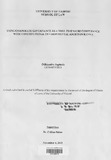| dc.description.abstract | This study examines the application of corporate governance as a tool for ensuring
corporate compliance with the constitutional environmental rights in Kenya. The
rationale for this assessment is founded on the need to balance the regulation of corporate
environmental impact with the important role of companies in the economy and society hence
the need to sustain their operations.
The thesis argues that environmental regulation as traditionally applied in Kenya under the
framework law, Environmental Management and Coordination Act (EMCA) and as buttressed
by sectoral legislation on the environment, presents two problems in relation to corporations.
Firstly, the law as has been implemented has failed to control corporate environmental
degradation as evidenced by the persistence of such degradation demonstrated in this study. This
signifies inadequacy in the legal framework thereof. Secondly, the framework law presents
potential harm of purely external (command-and-control) regulatory approach which can drive
corporations out of business and even the market entirely. This is detrimental to the economy. If
unaddressed, this approach may be transited into the implementation of the right to clean and
healthy environment under the Constitution of Kenya, 2010 which is yet to take root. This
situation therefore justifies an alternative approach for the actualization of the constitutional
environmental rights. The balance required, the study argues, can be achieved by innovatively
addressing the implications of constitutional environmental rights on corporate governance
through the internalizing the former in the latter as the alternative approach.
In pursuing its objective, this study examines the recognition of the right to a clean and healthy
environment, and its potential challenges and implications on corporate governance in Kenya.
The thesis proceeds from the organizing hypothesis that constitutional environmental rights have
fundamental legal implications on corporate governance. It argues that such implications have to
be considered as external costs which must be internalized by corporations to meet the demands
of constitutional environmental rights in Kenya. This internalization marks the optimal
interaction between corporate governance and constitutional environmental rights in Kenya.
The hypothesis is proved by assessing data obtained through library, documentary and Internet
research. The findings indicate that, optimally, the constitutionalization strengthens the
framework law on environmental protection. It also strengthens corporate law in relation to
corporate environmental management and compliance. Particularly, the right, if optimally
internalized, shall contribute to corporate environmental management in Kenya by: enhancing
the enforcement of environmental law; ensuring environmental accountability; improving access
to information; public participation in environmental decision-making and access to
environmental justice.
Furthermore, the thesis incorporates arguments suggesting a positive relationship between
explicit constitutional environmental rights and corporate environmental performance. On this
aspect, the study argues that constitutionally compliant corporations in Kenya will have minimal,
if any, negative environmental impact and rank higher on comprehensive environmental
indicators.
In conclusion, the thesis argues that constitutionalizing environmental protection represents a
potentially transformative process, capable of reconfiguring legal systems and processes on
environmental protection and corporate governance to place priority on corporate sustainability.
The thesis argues that constitutionalizing environmental rights in Kenya has the broader
implication of requiring internalization thereof as externalities in corporate governance. The
thesis thus makes proposals for optimal internalization and corporatization of the constitutional
environmental rights. Such proposals include: corporate environmental management systems,
disclosure and reporting requirements, responsible investment, restructuring for environmental
management, review and enforcement of the framework law as well as corporate law. | en |

